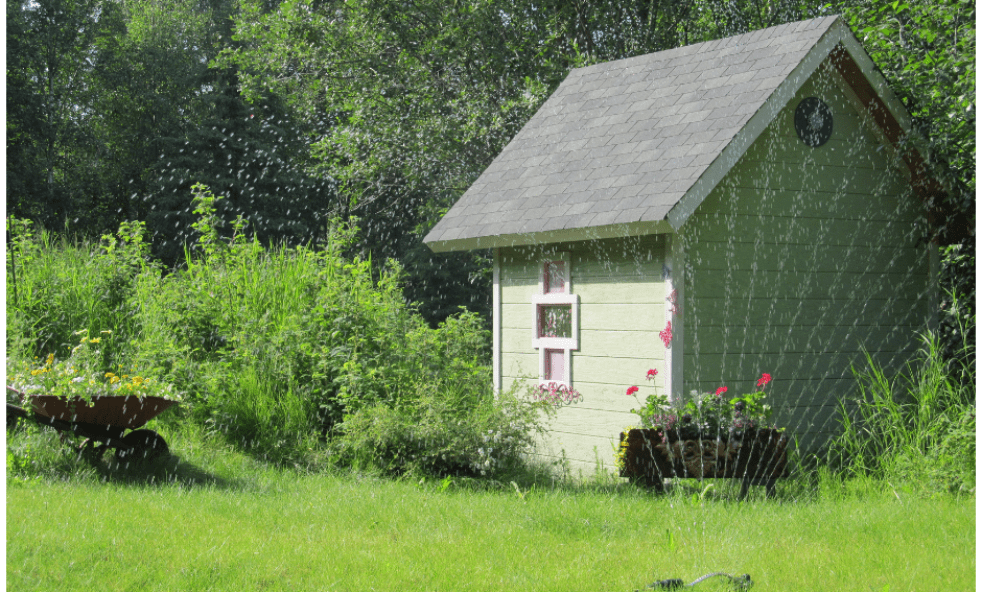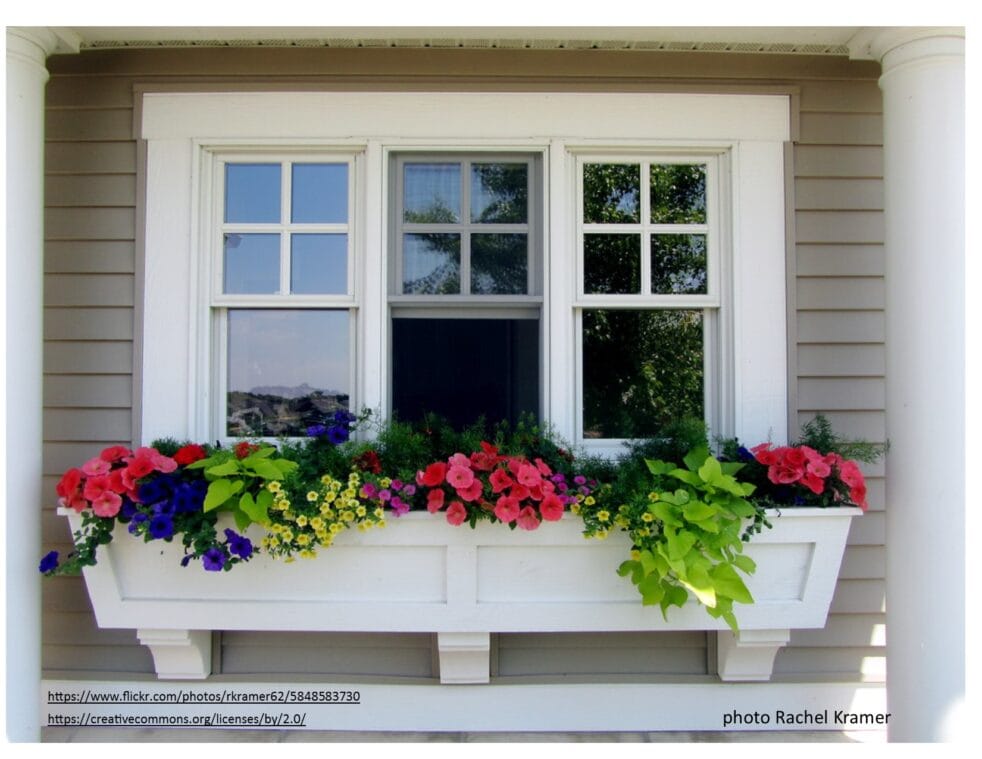
Plant Window Boxes
Every house should have window boxes! Not only are they pretty, but window boxes add a touch of pizzazz to your house as well. Because they are up off the ground, they are readily eye-appealing…bling, bling!
This article provides some tips on smart color combinations and textures to consider. Most importantly, how to plant and care for flowers in window boxes so they look fabulous all summer long.
The right window box materials
For gorgeous window boxes, start off with the right materials. Some window boxes are made of tough plastic. But most are made from wood. When shopping for window boxes, get the ones made of cedar and not pine. Pine rots fairly quickly, where cedar is durable and weather resistant.
You can always add trim pieces to further embellish a plain cedar box if you wish. You can leave them natural or paint to match the house.
Remember that even if the window boxes themselves seem fairly light, they’ll get heavier when filled with soil and heavier yet, after they’ve been watered. Use mounting brackets to support the boxes or a cleat-style hanger to evenly distribute the weight.

How to plant window boxes
There are two ways to plant window boxes. Some people use them like a planter. In other words, they do not actually fill the planter box with dirt. Instead, they keep the flowers in their pot and set them down on the inside. That’s just fine if you’re going with a single flower–such as bright yellow marigolds–for a tidy, formal look. Just remember to water them more frequently.
But here’s the best way to do it.
Step 1: Line the bottom
Most window boxes come with drainage holes in the bottom. If not, then you’ll need to drill your own holes in the bottom. To prevent the dirt from escaping, lay a strip of weed block mesh across the bottom. You want it to drain, but you don’t want the dirt to wash out either.
Sometimes, plastic liners are available. They fit inside the box and help to protect it from moisture.
Step 2: Add soil
Fill window basket about half-way full. Any ordinary potting soil will do.
Step 3: Add flowers
Be sure to leave a little bit of room in between for plants to grow and mature. The ‘rule of thumb’ is to combine plants with the same watering and light needs. Most sun-loving flowering annuals can go together. But check the tag from the greenhouse just to be sure. Some plants prefer part sun to full shade.
Gently press plants into place and add more soil as necessary to fill in the gaps. Water well.
Personally, I like to really stuff my baskets and window boxes full. But remember that window boxes are shallow. As the plant and its root systems grow, they’ll need watering more frequently. Maybe even daily, especially on the sunny side of the house.
Positioning window boxes under windows
If your planter box is under a window that open outward, don’t plant anything that would get in the way of opening the window. Taller flowers may be damaged that way. Lowering the window box is one solution. Or simply plant flowers or vines that trail down.

5 keys to plant window boxes that envy
There’s a couple of design tricks so your window boxes pack a punch. One, is to plant flowers that match your home’s style or colors. Is it formal or informal? Do you like the casual, country-cottage look or something bold and striking?
Another design element is harmony. If you have more than one window box, make them match for the best, eye-catching look.
Here are some more techniques to use:
Use Repetition in Your Planting

Repetition and a single color scheme creates a cohesive look when you have more than one window box. The greenery also blends well with the bedding plants below. The black window boxes add a touch of elegance.
TIP: there’s so much incredible variety in leafy green plants that you may not wish to use flowers at all. There are dark greens and pale yellow-greens and even variegated (marbled) colors in vines and trailers. In the photo above, note the contrast of the light green potato vine and its texture. A bright red flower really pops!
Selecting Plants for Your Window Box
For window boxes that will make your neighbor envious, choose three main plant types. The most successful window boxes contain a mix of these three primary plant types: The Centerpiece or “Focal point”, Fillers, and Trailers

Choose a Focal Point
Choose a main centerpiece or “focal point” plant and fill in around with complimentary flowers and vines. A centerpiece is the central or “main” flower feature in the box that has the “wow” factor. It’s usually planted in the middle and the other additions falling off to the side to accent it.
This could be a stout, upright growing flower like the hydrangea in the photo above.
Fillers
Fillers are smaller, mid-sized plants that bridge the in between spaces. In the photo above the “fillers” are the deep purple shamrock plant (right) and the variegated ivies. See how they balance out the arrangement at both ends of the window box.
If your window box sits under a window that opens, some people like to tuck in fragrant herbs like thyme, oregano, and mint as fillers. When a breeze blows, you’ll catch a slight whiff of mint!
Trailing plants
The smallest and daintiest of the three, trailers are the ones that cascade over the edge of the container. They add a delicate softness, and ‘romance’–if you will– to a window box. These could be impatiens, lobelia, bacopa and others.
If you’re uncertain, ask someone at the Greenhouse. By the way, your local greenhouse is the best place to go for the widest variety and healthiest plants.
Wrapping it up
Window boxes are as much decoration as they pretty. Start with a good quality box material and ensure it’s securely mounted. When choosing flowers, remember the three main types: Centerpiece (large), Fillers (medium), Trailers (small). If you have more than one window box the trick is complementary colors and repetition. When you’re done, you’ll be the envy of the block!
Finally, the best part about window boxes is you won’t have to pull weeds!
A special thanks to Miranda Crowell from BHG for her many, excellent recommendations. I’d like to invite you to join our little community of art and garden lovers. Scroll down just a bit to sign up. You’ll also get my “10 Artistic Ways to Make Your Yard & Garden Beautiful”, absolutely FREE!
Have fun planting your window boxes. Thanks for stopping by.
More lovely garden ideas
Fanciful Garden Design Trends of 2020
Create a simple “Secret Garden” of your own
How to get the Cottage Garden look on a small budget
The form you have selected does not exist.


Just wanted to put this out there…if you live on an upper story apartment or condo, be aware of your neighbors below when watering your boxes!
oh, boy! I’ll bet that happens…